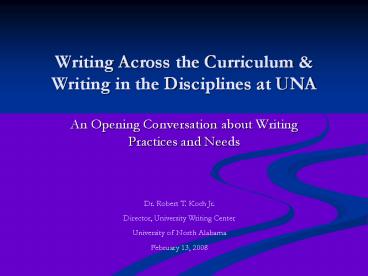Writing Across the Curriculum - PowerPoint PPT Presentation
1 / 10
Title:
Writing Across the Curriculum
Description:
Writing Across the Curriculum & Writing in the Disciplines at UNA ... include research papers, annotated bibliographies, formal essays and reports, etc. ... – PowerPoint PPT presentation
Number of Views:72
Avg rating:3.0/5.0
Title: Writing Across the Curriculum
1
Writing Across the Curriculum Writing in the
Disciplines at UNA
- An Opening Conversation about Writing Practices
and Needs
Dr. Robert T. Koch Jr. Director, University
Writing Center University of North
Alabama February 13, 2008
2
Todays Goals
- Develop an understanding of Writing Across the
Curriculum (WAC) and Writing in the Disciplines
(WID) - Develop an understanding of how composition is
presented in the University Writing Center (and
how it can help you!) - Begin to identify where our classroom writing
practices fit in the context of these ideas - Begin to identify areas of interest and need
3
What is Writing Across the Curriculum?
- Expressive described as writing to learn
(process more than product) - Emphasis on the development of ideas of
engaging in a conversation about knowledge - Examples include journals, short in-class
writing, outlines, other non-graded or informal,
low-investment/high-yield writing
4
What is Writing in the Disciplines?
- Transactional Also described as writing to
measure learning (process and product) - Emphasis on the accurate production of texts that
reflect the requirements of the discipline both
in content and in form. - Examples include research papers, annotated
bibliographies, formal essays and reports, etc.
5
The Basics of CompositionAs Presented in the
University Writing Center
- Writing/Composing Process
- Prewriting
- Often used interchangeably with the term
Invention - Encompasses activities such as Brainstorming,
Freewriting, Clustering, etc. - Writing
- Used interchangeably with the term Drafting or
Composing, though it is most often used to refer
to the entire composing process - Rewriting
- Encompasses Revision and Editing, which are two
distinct activities that often happen
simultaneously
6
The Basics of CompositionAs Presented in the
University Writing Center
- Higher Order Concerns (HOCs)
- These are the primary issues that must be
addressed in any piece of transactional writing. - HOCs are addressed through Revision
- There are seven HOCs
- Audience Purpose
- Thesis
- Organization
- Development
- Introduction Conclusion (my addition)
7
The Basics of CompositionAs Presented in the
University Writing Center
- Lower/Later Order Concerns (LOCs)
- Named for required thinking processes, they are
sometimes considered Later concerns because
they need to happen after HOCs have been
addressed. - LOCs are addressed through Editing
- There are four LOC categories (my arrangement)
- Grammar
- Mechanics
- Punctuation
- Spelling
8
Where Do Our Practices Fit?
- Expressive / Transactional ?
- Process / Product / Both ?
- Do we emphasize
- Higher Order Issues?
- Lower/Later Order Issues?
- Neither?
- Both ?
- For all of these, WHY?
9
What Do We Need?
- What would we like to learn more about?
- Theories?
- Practices? (Assignments, Assessment?)
- Overcoming Obstacles? (which ones?)
- Solutions to Immediate Problems?
- A Forum for further discussion?
- Face-to-face?
- Discussion List/Board?
10
References
- Reigstadt, T. J., McAndrew, D. A. (2001).
Tutoring writing A practical guide for
conferences. Portsmouth Boynton/Cook-
Heinemann. - Segall, M. T., Smart, R. A. (Eds.). (2005).
Direct from the disciplines Writing across the
curriculum. Portsmouth Boynton/Cook- Heinemann.































